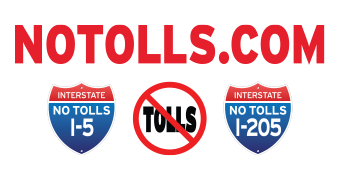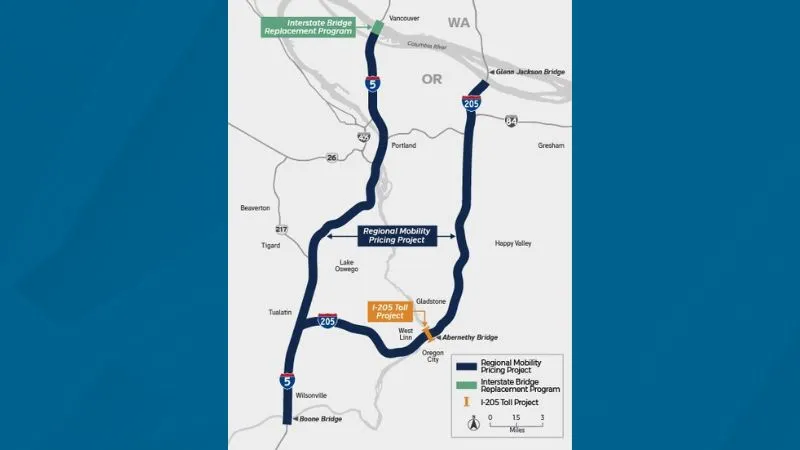The study was sponsored by West Linn, Oregon City, Tualatin, and Wilsonville
PORTLAND, Ore. (KOIN) – After Oregon Gov. Tina Kotek postponed the Oregon Department of Transportation’s proposed tolling program until 2026 after receiving negative public feedback, a new survey found that a majority of Oregon voters oppose the tolls.
The survey, conducted by DHM Research, polled voters in the Portland metro area in Clackamas, Multnomah, and Washington counties in early February 2024.
The survey was based on ODOT’s Regional Mobility Pricing Project, which would implement tolls on Interstate 5 and Interstate 205.
As part of the project, ODOT is studying tolls on I-5 between the Columbia River and the Boone Bridge in Wilsonville, and on I-205 from the Columbia River to where I-205 intersects with I-5 in Tualatin.

The survey found a large majority of voters are opposed to tolling in the Portland metro area, with 76% saying they are against it. Tolling opposition was highest in Clackamas County (91%), followed by Washington County (76%), and Multnomah County (69%).
Voters also specifically opposed ODOT’s proposals, with 71% against the Regional Mobility Pricing Project, and 64% of respondents opposing I-205 tolling.
Eight percent of voters strongly support the RMPP and 11% support Abernethy Bridge tolling, according to the survey.
Most of the voters said they opposed the tolling projects because of affordability concerns — noting the tolls would be burdensome to low-income drivers.
Additionally, 82% of respondents said public transit would not provide a viable alternative to avoid tolls. Another 80% cited opposition to the tolls because of increased traffic and safety concerns.
Instead of tolls, the voters support increasing registration fees for electric vehicles (61%), along with increased registration for all vehicles (33%), increased gas taxes (33%), and a pay-per-mile system – charging drivers a few cents per mile (24%).
The survey was sponsored by the United Food & Commercial Workers Local 555, along with the cities of West Linn, Oregon City, Tualatin, and Wilsonville — the cities impacted by the proposed tolling. The survey has a margin of error of +/- 4%.
City officials have been vocal about their opposition to the proposed tolling, with some calling for better traffic diversion planning.
“What’s not being acknowledged is the increased burden that diversion will cause on our jurisdictions. We have local streets; they’re not designed to take that type of traffic and we’ve been told that the proposal only deals with the regional system. It’s not concerned about the local streets,” Oregon City Mayor Denyse McGriff previously told KOIN 6 News.
West Linn Mayor Rory Bialostosky previously argued the program would harm low-income drivers, stating “We all want good transportation, good roads and funding there — we understand there’s a shortfall — but we don’t know if tolling is the right way because it’s a regressive tax. It hurts people who are not making ends meet the most.”
In December, ODOT commissioners announced plans to offer discounted tolls to low-income drivers.
Under the proposed program, Oregon and Washington residents with a household income of up to 200% of the federal poverty level would receive a tolling discount of at least 50%. Fees would be waived for federally recognized tribes, public transit, military, and emergency response vehicles.
Gov. Kotek previously postponed the program in response to local citizens and politicians saying their voices were not heard.


